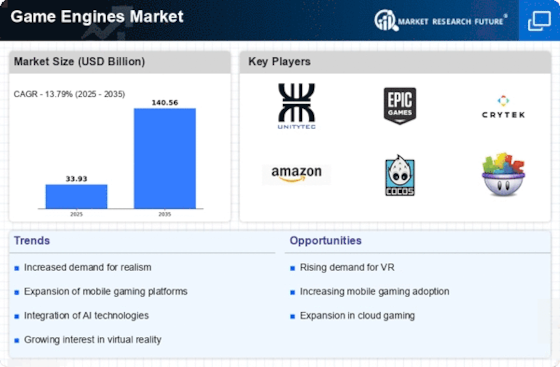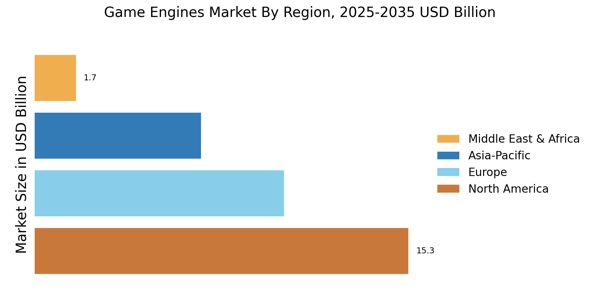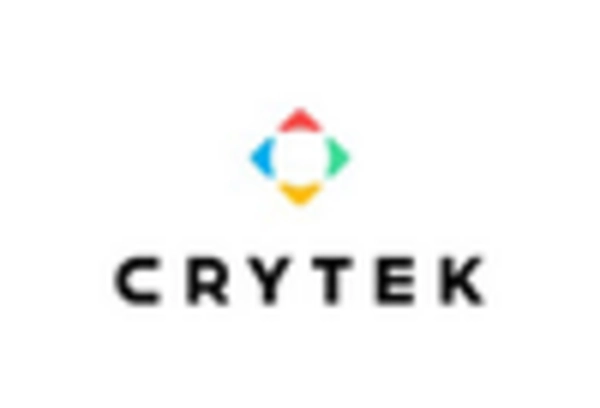Growing E-Sports Industry
The Game Engines Market is closely linked to the burgeoning e-sports sector, which has gained immense popularity in recent years. E-sports events attract millions of viewers and participants, creating a lucrative market for game developers and engine providers. The demand for competitive gaming experiences drives the need for robust game engines that can support high-performance graphics and seamless online play. Recent reports indicate that e-sports revenue is projected to reach impressive figures, further incentivizing investment in game development. This growth encourages game engine developers to enhance their platforms, ensuring they meet the specific requirements of e-sports titles. Consequently, the Game Engines Market is likely to benefit from the increasing prominence of e-sports, as it fosters innovation and competition among developers.
Expansion of Mobile Gaming
The Game Engines Market is significantly influenced by the rapid expansion of mobile gaming. With the proliferation of smartphones and tablets, mobile gaming has become a dominant segment, accounting for a considerable share of the overall gaming market. Recent statistics suggest that mobile gaming revenue is expected to surpass traditional console and PC gaming, highlighting a shift in consumer preferences. This trend compels game engine developers to optimize their platforms for mobile compatibility, ensuring that games run smoothly across various devices. The increasing accessibility of mobile games encourages a broader audience to engage with gaming, thereby stimulating demand for versatile game engines that can cater to diverse gaming experiences. As a result, the Game Engines Market is likely to see continued growth driven by this mobile-centric approach.
Rise of Indie Game Development
The Game Engines Market is experiencing a notable rise in indie game development, which is reshaping the landscape of the gaming sector. Independent developers are increasingly leveraging accessible game engines to create innovative and unique gaming experiences. This trend is facilitated by the availability of user-friendly tools and resources that empower smaller studios to compete with larger companies. Recent data indicates that indie games have gained significant traction, often achieving commercial success and critical acclaim. This shift not only diversifies the gaming portfolio but also encourages established game engine providers to cater to the needs of indie developers. As a result, the Game Engines Market is likely to witness a flourishing ecosystem of creativity and innovation, driven by the contributions of independent creators.
Integration of Advanced Technologies
The Game Engines Market is significantly impacted by the integration of advanced technologies such as artificial intelligence, machine learning, and blockchain. These technologies enhance game development processes and improve player experiences. For instance, AI can be utilized to create more realistic non-player character behaviors, while machine learning algorithms can analyze player data to tailor gaming experiences. Furthermore, blockchain technology is emerging as a means to secure in-game transactions and ownership of digital assets. The incorporation of these technologies not only streamlines development but also opens new avenues for monetization and player engagement. As developers increasingly adopt these innovations, the Game Engines Market is poised for transformation, potentially leading to more sophisticated and interactive gaming environments.
Increasing Demand for Immersive Experiences
The Game Engines Market is witnessing a surge in demand for immersive gaming experiences. As technology advances, players increasingly seek realistic graphics and engaging narratives. This trend is reflected in the growing popularity of virtual reality and augmented reality games, which require sophisticated game engines to deliver high-quality experiences. According to recent data, the market for VR and AR gaming is projected to reach substantial figures, indicating a robust growth trajectory. Game developers are thus compelled to adopt advanced game engines that can support these immersive technologies, driving innovation and competition within the Game Engines Market. The need for enhanced user engagement and retention further propels this demand, as developers strive to create captivating environments that resonate with players.

















